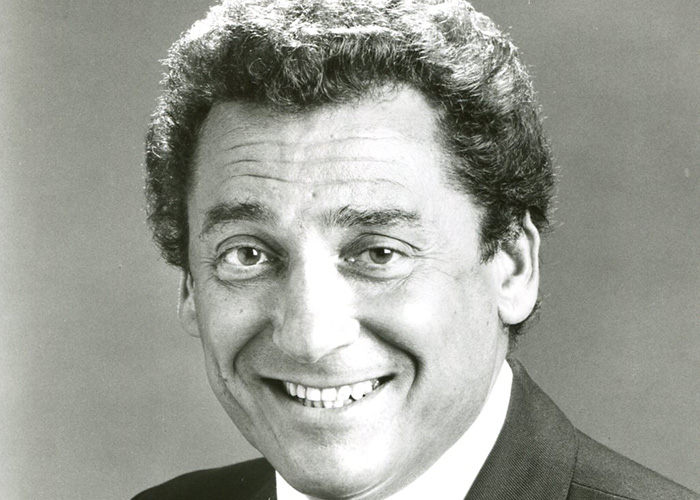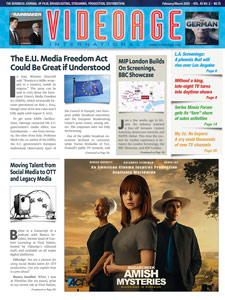Among former U.S. studios’ TV distribution presidents, there were three executives who were larger than life, and Lawrence (Larry) Eugene Gershman is one. After almost 60 years in the TV business, he’s still going strong.
Brooklyn, New York-born Gershman has long been a man of strong convictions. With a no-nonsense attitude, the former president of MGM/ UA Television Group and co-founder of World International Network (WIN) has been described as “a businessman with the aggressiveness and physique of a rodeo cowboy.” But, he is also a refined wine expert, a cuisine connoisseur and a raconteur.
Hollywood producer Pierre David, concurred: “I’ve known Larry for many years and worked with him for four years producing movies for WIN. He’s quite an extraordinary human being. Negotiating my deal with him was grueling. But then once trust was gained, our collaboration was great and we never referred to our agreement! And he’s so funny … One of the best raconteurs I’ve ever met.”
Joseph C. Tirinato, who was Gershman’s head of domestic TV distribution at MGM/UA, confirmed: “Larry is a larger-than-life character who always commands attention in any given situation be it personal or professional.”
Perhaps, due to this image, just mentioning the name “Gershman” to his industry peers increased their blood pressure, visible through reddened faces. However, his bark was bigger than his bite and in effect, he still is a gentle, very generous and honest man.
This writer discovered that, while president of MGM/UA, he refused a gold Rolex watch as gift from a then-prominent European broadcaster, which he considered a bribe. And, as a full disclosure, in 1981 Gershman prepaid $20,000 ($52,000 in today’s dollars) against future ad pages in order to contribute to the launching of VideoAge.
A lifelong industry man very active in television affairs and many other organizations, Gershman was chairman of the International Emmy Awards when the event was at the peak of its prestige.
He began his career with National Television Associates (NTA), a U.S. syndicator based in New York City that also distributed 20th Century Fox movies.
He joined NTA in 1957, just after getting his masters degree from Penn State University and before entering Temple Law School in Philadelphia: an action prompted by the fact that his first wife was having a baby and he needed a job. The offer came from the chairman of NTA, whom Gershman met while counseling his children at a basketball summer camp. The following year, NTA bought Channel 13 TV in New York and another TV station in Minneapolis and he became part of the management team.
In 1961, Gershman moved to TV ad sales at CBS-TV and, in 1964 he joined RKO General. About that period Dennis F. Holt Chairman/CEO U.S. International Media, a media buying service, recalled: “Larry and I have been great friends since the ’60s. We were both young salesmen for RKO, then the largest independent broadcast company in America. Besides making our calls and visits to the media buyers throughout Manhattan, we also found time to party. We all called Larry ‘Super Jew’ because he was movie star good looking. When Larry and I were in a bar, girls would come over to him and more than once they would slip their phone number into his pocket,” he said.
Gershman joined RKO with the hope of returning to Philadelphia where the company was to exchange TV stations with NBC-Westinghouse. When the deal was killed by the U.S. Justice Department, Gershman went back to CBS. He attended Fordham University School of Law in the evening and was admitted into the New York State Bar and the National Bar in 1968. “I had promised my father before he died in 1950 that I would go to law school,” he later said.
Gershman recalled, “when I was living in Brooklyn, my father owned several gas stations and he would be running from one to the other. I don’t remember seeing him at home when the sun was out, including weekends. After he had his first heart attack, we moved to Philadelphia. He bought a neighborhood grocery store and we lived above it.”
After NTA, Gershman’s work covered every aspect of television: from station manager at NBC-TV (1969) to productions at Don King Productions (1975) to international program distribution at Viacom.
“Viacom was my introduction into the international business in 1976. This was my first real exposure to the international side and I was very fortunate,” he commented.
Veteran TV executive Ave Butensky offered some insight: “I’ve known and worked with Larry Gershman for 60 years. We both were immersed in the business of local television. He sold! I bought! But, it wasn’t simple. In those early days WCBS-TV’s The Late Show was where every advertiser wanted to be, [but] to get one Late Show spot, you were coerced to buy a bunch of other spots that you did not want. Larry wanted to sell me as many Late Show spots as possible, and I wanted to buy as many as possible.
“There came a time when we did have a CBS confirmation for a schedule we just purchased, that did include a few spots in The Late Show, but CBS decided to unconfirm that which they earlier confirmed, and that’s when it hit the fan. Larry phoned me. He was on the warpath [and] offered a new plan: He said, ‘forget about The Late Show, instead, put your money on [NBC’s] The Tonight Show!’ The Tonight Show? Larry exited CBS, and went to work across the street at WNBC-TV. Goodbye Late Show. Hello Tonight Show,” said Butensky.
Subsequently Gershman explained how he joined MGM: “David Begelman was hired by [MGM owner] Kirk Kerkorian to rebuild MGM. Begelman hired me to run worldwide sales. It was a bigger opportunity and I went there in June of 1980. Their annual total sales for domestic and foreign were $33 million.
“In my first full year there, we brought in $102 million ($270 million in today’s dollars). At that time, foreign sales were done by CIC, which was owned by Universal and Paramount.
“In the second year, we took out CIC and formed UIP, the international distribution company owned by Paramount, MGM and Universal. That was just for theatrical and video. Television was handled separately. The next year, we bought United Artists.”
Domestically, MGM’s film product was being sold by UA. They set up their own MGM/UA TV sales organization under Joe Tirinato.
“Next was Fame. After the feature film had come out in 1980, we made a TV pilot and sold the series to NBC. After 16 episodes, NBC canceled it.
In April 1982 at MIP-TV, anticipating that Fame might be canceled, Gershman met with buyers from around the world. It was a show that was performing well internationally, and he announced, “We’re going to keep it on the air, but you have to get me some answers because when we go to the L.A. Screenings in May; we’re going to have to move really fast.
“At the L.A. Screenings when it was confirmed that NBC was not going to renew Fame, I reached the same buyers, and, within two days, got the commitments. In those days, the top network show internationally was grossing about $180,000 per hour ($475,000 in today’s dollars). We got about $350,000 per hour ($868,000 in today’s dollars),” he said.
In the U.S., he met with Bob Bennett, who was running the seven Metromedia stations (now the FOX stations). In one meeting he agreed to commit for all of his stations and within two weeks, 92 percent of the country was sold. “We stayed on the air for another 131 episodes. Then the MGM/UA Network came along. One of my responsibilities was to sell the theatrical films to U.S. TV networks. It was right about that time that the networks stopped buying big theatrical films. Pay services were buying movies first. In the beginning, their audience wasn’t strong and the penetration wasn’t deep. So, when a movie played on HBO or Showtime, it didn’t matter. You could still get a 40 rating with a James Bond film or a big picture on the free-TV networks,” said Gershman.
He continued: “As the HBO and Showtime market share increased, there was less leftover for the networks. In 1983, all of the networks combined bought six movies for the year. I had pictures that were carried on the books worth about $82 million in projected sales ($199 million in today’s dollars), and nobody wanted to buy them.
Realizing he had a serious problem on his hands, he came up with the concept of the MGM/UA Premiere Movie and called Tony Cassara, who was then general manager of KTLA-TV and explained the concept. “It was a 24/30 package: 24 movies went into barter and 30 went into pay-TV and syndication.
“We would offer 24 movies that had never been played on free television, and we would barter those for a one-month period. The station would get two plays in that one month.
“First the movie played on pay-TV ($900,000 per title); then the television stations received one movie per month on a barter basis for 24 months ($600,000 per title for the whole U.S.); then it went back for a second pay-TV window ($600,000 per title): then, back to the TV stations for a normal film license term — i.e., three-four years-for cash.”
He then added six more titles that had previously played network TV to make the full 30. He sold the package, and cleared over 90 percent of the U.S.
“At the time the stations that committed to the barter also had to commit to the cash purchase. It accomplished several things: It created the barter market. It created a second pay window, and that was worth another $600,000 per picture. Then there was the cash sale and all this happened simultaneously. So the combination of the barter deal and the cash sales grossed $86 million for the company on those 30 films. Within a year, every studio was doing it.
“But the Premiere Network had no impact outside the U.S. Those pictures were sold internationally based on their theatrical reputations.”
Internationally, Gershman is credited with negotiating a record-setting $80 million sales agreement for MGM/UA with Degeto on behalf of ARD, the first German television network, which was the largest sale of television programming outside of the U.S. at that time. That sale, however, was subsequently criticized by his successor at MGM, Norman Horowitz (posthumously an Int’l TV Distribution Hall of Fame honoree), for tying up rights for too long a period.
In March 1986, Ted Turner purchased MGM/UA from Kerkorian. Later that same year he sold to Kerkorian the UA portion of the library and kept the MGM films made up to May of 1986, he said.
“At that time we were going through all sorts of management changes, and I wanted to go into business for myself and I had the idea for WIN. For the most part, the studios didn’t want to be in the business [of MOW and miniseries]. They wanted to be in the television-series business because it had a bigger profit margin,” explained Gershman.
That particular time is described in detail in Gershman’s 2015 autobiography, A Kid From Brooklyn, where he revealed negotiations with Italy’s Silvio Berlusconi for a joint venture that, he wrote, were derailed by Berlusconi’s associate, (the late) Carlo Bernasconi, because Gershman refused to pay him a kickback.
In 1988, moving to the area of movies and miniseries, he went to international buyers and asked, “if they’d pre-buy these movies.’ Each buyer paid a small amount to join WIN. It was like a membership fee. The smallest was $15,000 and the largest $75,000. In aggregate, it raised about $550,000 from 22 broadcasters. That was their development fund.
“We produced 91 movies and miniseries, won three Emmys and other top prizes like the Golden Nymph at the Monte Carlo Film Festival,” Gershman said.
Of that period, Anita First (formerly Anita Gershman — Larry’s ex and third wife and business partner) recalled: “During one trip to MIP, Larry was on the phone in the sitting room of our suite at The Majestic closing a deal for Lester Persky’s miniseries A Woman Named Jackie, and I was on the phone in the bedroom of the suite closing a deal for the Michael Mann miniseries Drug Wars: Camarena. We kept running back and forth into each other’s room to check on deal terms and whether we would/should agree to the various open points. We each closed our deal: Drug Wars won the Outstanding Miniseries Emmy for 1990, and Jackie won the Outstanding Miniseries Emmy for 1992. Larry handpicked those projects for WIN to acquire,” she said.
“In 1994 there was a change in WIN’s ownership,” Gershman continued: “Our French partner, Revcom, did not want to stay in the entertainment business and Germany’s Degeto acquired Revcom’s share in WIN. Shortly after that, Carlton squeezed Central TV out of WIN, so there were two new partners in WIN. In late 1995 they acquired the old WIN library and called their company Hamdon.
“Anita and I started over, although we kept the name: WIN [and added] LLC. But in the first WIN, the members had a first look arrangement. In the new WIN, the members would buy everything on an output basis.”
WIN LLC ceased production in 2002 after having produced close to 100 titles, but Gershman has continued to market the WIN titles around the world whenever availabilities come up. In the past two years he also has executive produced four movies for Lifetime.
Kevin Goetz, founder and president of Screen Engine, a audience testing company, added some insight: “Larry gave me my first movie to produce and my second…and my third…and my fourth. His loyalty knows no bounds. He’s old school in the best sense but ageless in his talent, ideas and energy.”
Concluded Zane Bair, U.S. rep for Australia’s Seven Network: “To me, Larry’s most noble attribute is the fact that he has always been the boy that grew up on those old-school streets of Brooklyn. No matter whom he learned from or with whom he rubbed elbows, Larry remains that boy; that man.”
by Dom Serafini
Audio Version (a DV Works service)












Simply stated, he’s the greatest. Gershman with a capital “G” for gentleman and for genius.